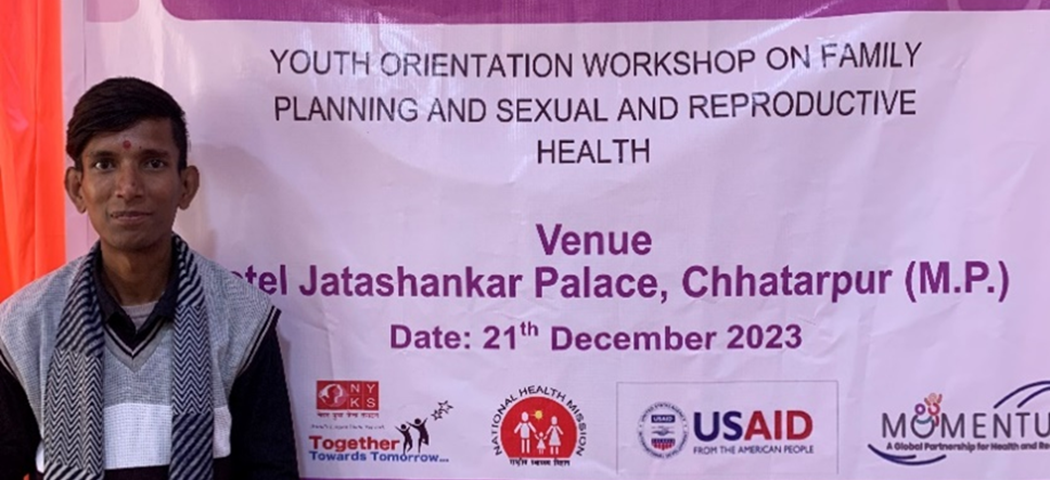Deepak Kushwaha: A Beacon of Social Change
Published on August 6, 2024

By Arpit Sinha, State Project Manager, Madhya Pradesh; with contributions from Dawood Alam, Associate Director for Social and Behavior Change Communications, MOMENTUM Safe Surgery in Family Planning and Obstetrics
Deepak Kushwaha, 26, resides in the bustling town of Chhatarpur, Madhya Pradesh in India, where he dedicates his days to serving his community and advocating for causes close to his heart. Deepak’s passion for social justice and environmental conservation burned brightly within him from a young age. He joined Nehru Yuva Kendra (NYK) as a volunteer during his college days. It is an autonomous organization under the Government of India, Ministry of Youth Affairs and Sports offering avenues for rural youth to take part in the process of nation-building as well as providing opportunities for personal and professional development.
In this capacity, Deepak became concerned by the lack of knowledge and awareness surrounding family planning (FP), especially among youth in his community. He explains, “The prevalence of unintended pregnancies in my state is very high and these amount to half of total pregnancies. The majority of unintended pregnancies affect young people ages 20-24.”
India has the world’s largest youth population with 250 million people ages 15-24. While illegal, 1.5 million girls get married each year before they turn 18.1 According to the Guttmacher Institute, 3.4 million adolescents in India—including 195,000 sexually active unmarried women—want to avoid pregnancy but 71% of them are not using a modern method of contraception.2 If all adolescents who wanted to avoid pregnancy were able to use modern contraceptives, provided the full range of contraceptive options, counseling, and information, and if all needs for maternal, newborn, and related reproductive healthcare were met, there would be 732,000 fewer unintended pregnancies annually.3
Deepak was happy to learn about an orientation for youth volunteers on sexual and reproductive health rights focusing on contraception led by MOMENTUM Safe Surgery in Family Planning and Obstetrics. The predominant contraceptive method used by women aged 15-49 years in India is female sterilization, but among youth (15–24) it is short-acting reversible methods (pills and condoms).[4] He explains, “I was only aware of condoms.” Deepak notes that many young people hesitate to ask questions and that there is a general lack of awareness about the various available contraceptive options. He believes that this hesitancy and lack of knowledge contributes to low FP usage among youth.
The MOMENTUM orientation enabled Deepak to learn about a range of contraceptive choices including oral contraceptive pills, injectable contraceptives, as well as long-acting reversible contraception (LARC), such as sub-dermal implants and intrauterine contraceptive devices which are safe, effective, inexpensive, and require little or no maintenance. Because of this, users have much better compliance rates than with other hormonal methods.
MOMENTUM employs a participatory, inclusive, youth-centered approach to engage young people. In collaboration with NYK and other local NGOs, the project oriented 106 male and female youth volunteers aged 15-30 in December 2023 in Satna and Chhatarpur districts of Madhya Pradesh in India. The purpose was to build awareness of informed and voluntary uptake of modern contraceptives, particularly LARC, and provide a platform for experience sharing, knowledge exchange, and consulting young people to identify ways to meaningfully engage them. Following the training, youth are expected to disseminate learnings to their peers and to the community through community-level platforms (youth clubs) established under NYK or the National Service Scheme.
Deepak is likely to emerge as a true champion of social change. He thinks that his dedication and passion will inspire many young people in the community to become more proactive about using contraceptives. As Deepak continues his work as a social advocate and educator, he remains steadfast in his belief that every individual deserves access to comprehensive information and resources to make informed decisions about their health and well-being. At the end of the MOMENTUM training, Deepak noted, “Such trainings are an eye-opener for me, and I should be able to talk about more contraceptive choices.”
References
- UNFPA, UNICEF. 2020. India country profile. Global Programme to End Child Marriage. https://www.unicef.org/media/111381/file/Child-marriage-country-profile-India-2021.pdf
- Murro R., Chawla R., Pyne S., et al. 2021. Adding It Up: Investing in the Sexual and Reproductive Health of Adolescent Women in India. New York: Guttmacher Institute. https://www.guttmacher.org/report/adding-it-up-investing-in-sexual-reproductive-health-adolescents-india
- Ibid.
- International Institute for Population Sciences – IIPS/India and ICF. 2022. India national family health survey NFHS-5 2019-21. Mumbai, India: IIPS and ICF. https://www.dhsprogram.com/pubs/pdf/FR375/FR375.pdf

